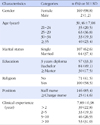Abstract
Purpose
The purpose of this study was to analyze the effects of empathy, resilience and self-care on compassion fatigue in oncology nurses.
Methods
The study design was a descriptive survey and questionnaires were collected from December 1 to 15, 2013. Participants were 171 oncology nurses caring for cancer patients. Data was analyzed using independent t-test, Scheffé test, one-way ANOVA, Pearson correlation coefficient and hierarchical multiple regression with the SPSS/WIN 18.0 program.
Results
Seventy two percent of the participants reported a moderate to high level of compassion fatigue. Empathy was positively correlated with compassion fatigue, whereas, resilience and self-care had negative correlations with compassion fatigue. Finally, empathy, resilience, self-care and age accounted for 30% of the variance in compassion fatigue.
Figures and Tables
References
1. Watson J. The theory of human caring: Retrospective and prospective. Nurs Sci Q. 1997; 10(1):49–52. http//dx.doi.org/10.1177/089431849701000114.
2. Coetzee SK, Klopper HC. Compassion fatigue within nursing practice: A concept analysis. Nurs Health Sci. 2010; 12:235–243. http//dx.doi.org/10.1111/j.1442-2018.2010.00526.x.
3. Abendroth M, Flannery J. Predicting the risk of compassion fatigue: A study of hospice nurses. J Hosp Palliat Nurs. 2006; 8(6):346–356.
4. Figley CR. Compassion fatigue as secondary traumatic stress disorder: An overview. In : Figley CR, editor. Compassion fatigue: Coping with secondary traumatic stress disorder in those who treat the traumatized. New York: Brunner/Mazel;1995. p. 1–20.
5. Yang YH, Kim JK. A literature review of compassion fatigue in nursing. Korean J Adult Nurs. 2012; 24(1):38–51. http://dx.doi.org/10.7475/kjan.2012.24.1.38.x.
6. Joinson C. Coping with compassion fatigue. Nursing. 1992; 22(4):116118–119. 120
7. Beck CT. Secondary traumatic stress in nurses: A systematic review. Arch Psychiatr Nurs. 2011; 25(1):1–10. http://dx.doi.org/10.1016/j.apnu.2010.05.005.x.
8. Keidel GC. Burnout and compassion fatigue among hospice caregivers. Am J Hosp Palliat Care. 2002; 19(3):200–205. http://dx.doi.org/10.1177/104990910201900312.
9. Potter P, Deshidelds T, Berger J, Clarke M, Olsen S, Chen L. Evaluation of a compassion fatigue resiliency program for oncology nurses. Oncol Nurs Forum. 2013; 40(2):180–187. http://dx.doi.org/10.1188/13.ONF.180-187.
10. Kim HJ, Choi HJ. Emergency nurses' professional quality of life: Compassion satisfaction, burnout and secondary traumatic stress. J Korean Acad Nurs Adm. 2012; 18(3):320–328. http://dx.doi.org/10.11111/jkana.2012.18.3.320.
11. Lee HJ. The influential factors upon compassion fatigue in hospital nurses [master's thesis]. Busan: Dong-A University;2013.
12. Monroe A. Psychiatric nurses' management of compassion fatigue through self-care. Berkeley, CA: The Wright Institute;2008.
13. Kim S, Kim JH, Park J, Suh EY, Yang HJ, Lee SY, et al. Oncology nurses' professional quality of life in a tertiary hospital. J Korean Clin Nurs Res. 2010; 16(3):145–155.
14. Kim BN, Oh HS, Park YS. A study of nurses's resilience, occupational stress and satisfaction. Korean J Occup Health Nurs. 2011; 20(1):14–23.
15. Stamm BH. The concise ProQOL manual. 2nd ed. Pocatello, ID: ProQOL.org;2010. http://www.proqol.org/uploads/ProQOL_Concise_2ndEd_12-2010.pdf.
16. Block J, Kremen AM. IQ and ego-resiliency: Conceptual and empirical connections and separateness. J Pers Soc Psychol. 1996; 70(2):349–361.
17. Huggard PK. Managing compassion fatigue: implication for medical education [dissertation]. New Zealand: University of Auckland;2008.
18. Radley M, Figley CR. The social psychology of compassion. Clin Soc Work J. 2007; 35:207–214. http://dx.doi.org/10.1007/s10615-007-0087-3.x.
19. Saakvitne KW, Pearlman LA. Transforming the pain: A workbook on vicarious traumatization. New York: Norton;1996.
20. Alkema K, Linton JM, Davies R. A study of the relationship between self-care, compassion satisfaction, compassion fatigue, and burnout among hospice professionals. J Soc Work End Life Palliat Care. 2008; 4(2):101–119. http://dx.doi.org/10.1080/15524250802353934.x.
21. Figley CR. Compassion fatigue: psychotherapists chronic lack of self care. J Clin Psychol. 2002; 58(11):1433–1441. http://dx.doi.org/10.1002/jclp.10090.x.
22. Koloroutis M. Relationship-based care: A model for transforming practice. Minneapolis: Creative Health Care Management;2007. p. 136–142.
23. Sabo B. Reflecting on the concept of compassion fatigue. J Issues Nurs. 2011; 16(1):1. http://dx.doi.org/10.3912/OJIN.Vol16No01Man01.
24. Kim HJ. The structural equation model of the burnout in clinical nurses based on CS-CF model [dissertation]. Seoul: Chung-Ang University;2013.
25. Jeon SY, Ha JY. Traumatic events, professional quality of life and physical symptoms among emergency nurses. Korean J Adult Nurs. 2012; 24(1):64–73. http://dx.doi.org/10.7475/kjan.2012.24.1.64.
26. Newton S, Hickey M, Marrs J. Mosby's oncology nursing advisor: A comprehensive guide to clinical practice. St. Louis: Mosby/Elsevier;2009.
27. Davis MH. Individual differences in empathy: A multidimensional approach. Austin, TX: The University of Texas at Austin;1979.
28. Park SH. Empathy and prosocial behavior. Seoul: Moonumsa;1997.
29. Yoo SK, Sim HW. Psychological protective factors in resilient adolescents in Korea. Korean J Educ Psychol. 2002; 16(4):189–206.
30. Jones SH. A self-care plan for hospice workers. Am J Hosp Palliat Care. 2005; 22(2):125–128. http://dx.doi.org/10.1177/104990910502200208.




 PDF
PDF ePub
ePub Citation
Citation Print
Print







 XML Download
XML Download